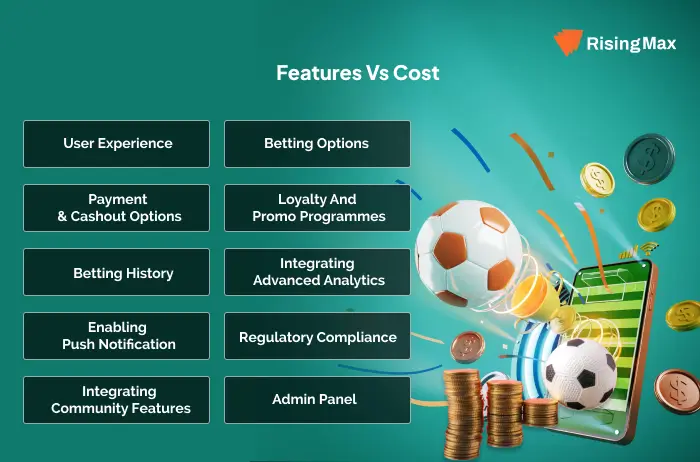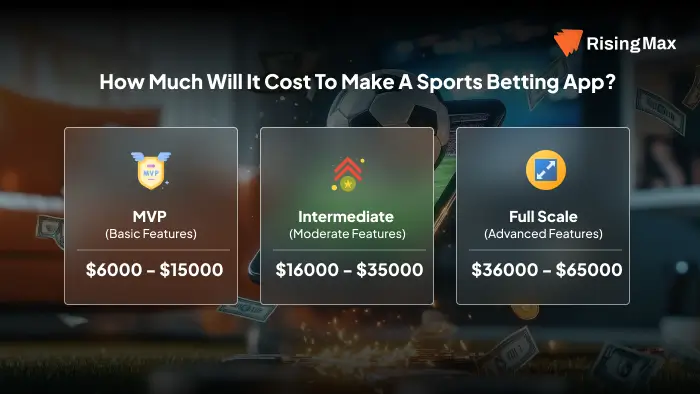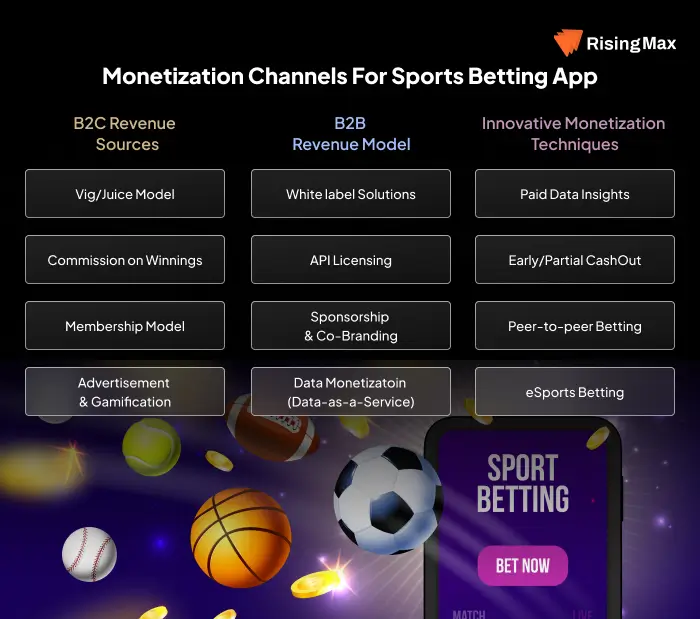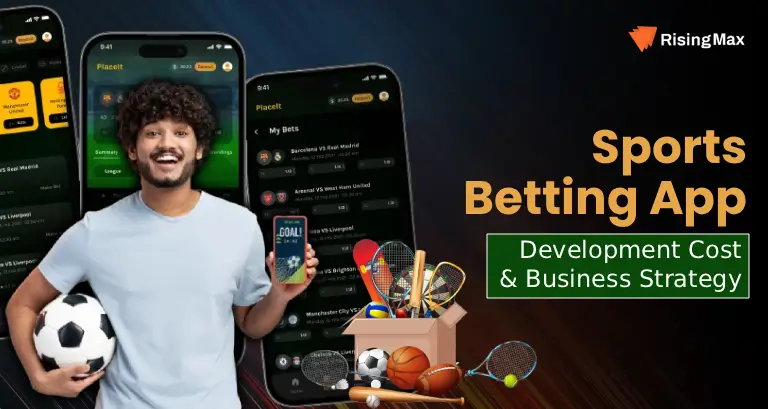Key Takeaways
- The global sports betting market is set to reach $274.48 billion by 2034, creating huge opportunities for new entrants.
- Sports betting app development cost in 2026 is as: MVP ($6K–$15K), Moderate ($16K–$35K), Advanced ($36K–$65K+).
- Licensing cost for betting app in the U.S. can range from $5000 to $50,000+, depending on the state.
- Revenue models for sports betting apps include vig/juice, commissions, memberships, ads, and innovative streams like eSports & peer-to-peer betting.
─────────────────────────────────────────────────────────
Sports are a primary source of entertainment for most people, and when combined with betting, the entertainment simply doubles! Betting giants such as DraftKings cater to more than 4.5 million active users, generating revenue of $4.7 billion in 2024.
That’s quite impressive, right? Moreover, the global sports betting market is expected to reach $274.48 Bn by 2034. This market growth makes now the perfect time for entrepreneurs to invest in this niche.
With several affordable options available, developing your own app to enter this industry is quite accessible and inexpensive.
As of 2026, the sports betting app development cost in the USA is between $6,000 (for MVP) and $65,000 (for enterprise level). The cost to build a sports betting app depends on factors such as feature set, app scope, tech stack, obtaining government compliance, and the location of the development team.
In this betting app development strategy guide, we bring you field data about the app-type-wise cost structure, factors influencing it, the development process, and the monetization model.
Features That Shape the Cost of Sports Betting App Development

Features that your betting app will have are one of the most influential factors to drive the overall cost of a sports betting app. Before running into the entire cost model breakdown, let us take a look at the various features required in such an app, along with nice-to-have features, and how they impact the overall development cost.
1. Easy & Fluid User Experience
Features Included:
- Signup
- User experience
- Accessible elements
- Personalization
Impact on Cost – Low.
The first and foremost feature is the user experience. Better user experience comes from a good UI and Design. Creating a custom experience requires a large amount of R&D along with tons of beta testing.
In case of betting apps, you might have noticed that most of the apps have a similar kind of interface hosting almost similar features, such as user login, wallet in the top corner, live score update in the upper corner of the screen, etc.
All of these elements are essential, and placing them in almost similar elements gives users a sense of familiarity with the platform.
Most of the features are basic and included even in the MVP; therefore, they have a low impact on shaping the cost.
2. Diverse Betting Options & Live Betting
Features Included:
- Live betting
- Diverse betting options
- Good odds
- Tap and bet feature
Impact on Cost: High.
How users will place bets is the core functionality of your app; it needs to be diversified and advanced. Focus on giving multiple and diverse betting options to users, such as:
- Pre-match betting
- Live betting
- Single bets (single outcome)
- Parlay bets (combine multiple bets to have one bigger outcome)
- Prop bets (specific event bet, e.g., first goal scorer, etc.)
- Exchange betting (betters play against one another instead of a bookmaker)
- Future bets (For long-awaited results such as tournaments, etc.)
- eSports betting (One of the most popular types these days)
Additionally, keep a balanced and good odds of winning in your app so that users can have good chances of winning. Such a balanced mechanism will attract more and more users to your platform in a short time span.
3. Secure Payments & Cashouts
Features Included:
- Easy cashouts and deposits
- Secured payment gateways
- Multiple payment options
- Multi-Factor authentication (MFA)
Impact on Cost: Moderate-to-High.
Data and payment security are not an add-on feature for betting apps; it is essential, even if you are developing an MVP. Make sure you provide multiple payment gateways to the users. Consider integrating PayPal’s Payflow, BlueSnap, Stripe, Square, or Adyen into your betting app for both cash deposits and cashouts.
Also, take preventive measures by adding an extra layer of security or by integrating Multi-Factor profile authentication with your platform. Such preventive measures ensure that the platform is secured.
4. Promotion and Loyalty Rewards
Features Included:
- Bonus and promotions
- Loyalty programs and offers
- Referral bonus points
- Bonuses on cash deposits
Impact on Cost: Moderate.
Bonuses and Loyalty rewards are a great way to both attract new users and retain the existing ones. You can create a referral program in which, if a user refers, he/she will get $100 as a bonus point, which they can use for betting with certain terms and conditions.
The same can be done when a user deposits money or wins a bet, to give a certain type of bonus that they can directly or indirectly use again in the betting apps or purchase coupons for online shopping.
5. Betting History & Analytics
Features Included:
- Betting history
- Advanced analytics and reporting
- Integration of AI/ML
- AI-powered real-time analysis
- Auto place/cashout bets
- Risk analysis
Impact on cost: Moderate to High.
The next essential feature (and feature that can make your betting app unique) on our list is enabling users to see their betting history and some AI-powered features. In times where AI can help us in thousands of ways, integrating such technology makes your betting app future-proof.
AI & ML allow for advanced analytics and provide real-time analysis during live betting or tournaments. Furthermore, ML can also be deployed to make risk assessments, thus creating an ecosystem of safe betting.
In bets, it requires placing recurring bets and withdrawing the cash in a short span of time. You can offer users features that enable them to let an AI chatbot handle repetitive tasks.
6. Notifications & Alerts
Features Included:
- Push Notifications
- Betting advices (blogs, videos, or newsletters)
Impact on Cost: Low to Moderate.
To keep users returning to your platform even when they are not placing bets, allow them to receive push notifications and the latest updates regarding the betting trends via blogs, videos, or newsletters.
This feature will help users stay updated with the most recent trends, all while staying connected with your platform.
7. Regulatory Compliance and Security
Features Included:
- Data privacy and regulatory compliance
- Improved security
Impact on cost: High.
To operate and own a betting app, you must receive government-authorized regulatory compliance. In some countries, online betting is illegal; therefore, consider obtaining or atleast knowing the process in detail before you invest in building an app.
Also, when the app is under development, maintain clear communication with the project manager to ensure that all the features that are currently in development or in the pipeline are government-compliant.
8. Community & Social Features
Features Included:
- Social sharing
- Betting community forums and tipsters
Impact on cost: Moderate
Adding socializing elements to a betting platform boosts user engagement as they get an integrated medium where they can interact with like-minded people. For social media enthusiasts, you can consider allowing them to share their winnings over social media.
Also, letting users create communities, forums, or threads is an effective strategy to keep users active on your betting platform.
9. Admin & User Management
Features Included:
- User management
- Payment resolving mechanism
- Fraud detection tool
- Real-time query resolution
Impact on Cost: Low to Moderate.
The admin panel is used by app moderators. Therefore, it is essential to include a comprehensive set of features such as user management, payment resolutions, fraud detection, force user ban, and anomaly detection in transaction records, along with real-time query resolution of users, especially related to the payments.
Features vs Cost of the Sports Betting App Development
| Feature Category | Example Features | Cost Impact |
| Seamless User Experience | Signup/login, personalized dashboard, accessibility | Low |
| Diverse Betting Options & Live Betting | Real-time odds, live streaming, “tap & bet” | High |
| Secure Payments & Cashouts | Multiple payment gateways, e-wallets, and withdrawals | Moderate–High |
| Promotions & Loyalty Rewards | Bonuses, referrals, personalized offers | Moderate |
| Betting History & Analytics | Past records, advanced reporting, and AI insights | Moderate–High |
| Notifications & Alerts | Match updates, odds changes, betting tips | Low–Moderate |
| Regulatory Compliance & Security | Data privacy, fraud detection, AML/KYC | High |
| Community & Social Features | Forums, tipsters, social sharing | Moderate |
| Admin & User Management | User control, reporting, backend monitoring | Low–Moderate |
Factors That Determine the Cost of Sports Betting App Development
Although features have a great impact on the overall cost to build a sports betting app, it is still one of the factors. Here are some of the other factors that add to the overall cost of mobile app development services.
These are the factors that impact the cost. Our next section covers the sports betting app development process – from planning to execution.
Design Complexity
Navigating through a website should not feel like a humongous task. For sports betting apps, there are a few layouts regarding certain features, and it is better to place them in those positions, as it will give users a sense of familiarity with the platform.
Adding engaging features such as dark mode, subtle animations, gamification, or personalized dashboards increases the overall cost. However, if you are just putting your app in the market to test the idea and the audience, proceeding with MVP, which has minimal design, is the go-to option.
| Level | Example Features | Approx. Cost |
| Basic | Signup/login, basic betting options, simple admin panel | $2,000 – $5,000 |
| Moderate | Live odds, bet history, user wallet, push notifications | $6,000 – $12,000 |
| Advanced | AI-driven betting tips, loyalty programs, advanced analytics, and personalization | $15,000 – $20,000 |
App Complexity & Features
We have already discussed in the previous section how the features influence the cost of overall app development. While basic features do not add much to the overall cost of the project, adding advanced features such as integration of AI/ML, fetching real-time updates, and automated betting adds a significant amount to the project.
| Level | Example Features | Approx. Cost |
| Basic | Signup/login, basic betting options, simple admin panel | $2,000 – $5,000 |
| Moderate | Live odds, bet history, user wallet, push notifications | $6,000 – $12,000 |
| Advanced | AI-driven betting tips, loyalty programs, advanced analytics, and personalization | $15,000 – $20,000 |
Platform Coverage
Next comes the platform on which you want to host your app. If your target is the Google Play Store, you need to pay a one-time fee of $25, while if you want your app on the Apple App Store, you need to pay $99 annually.
Based on the platform you are targeting, you need to choose the tech stack. For a single platform, you may opt for Swift (for iOS) or Kotlin (for Android), but if you prefer multiplatform compatibility, then there are two options:
- Either develop two different versions of the app using the native frameworks for both platforms. Or,
- Go for cross-platform app development frameworks such as Flutter or React Native.
With updated features such as turbomodules, Hermes engine, fabric, and codegen – React Native provides cost-effective development solutions without compromising the quality.
| Level | Example Features | Approx. Cost |
| Basic | Single platform (Android or iOS) | $1,500 – $3,000 |
| Moderate | Cross-platform (React Native/Flutter) for Android + iOS | $2,000 – $5,000 |
| Advanced | Dual-platform with native frameworks (Android + iOS) + Web support | $7,000 – $9,000 |
Frontend Development – The Front Look
How your app is going to look and what the usability flow will include, the adaptive and responsive design is covered under frontend development. After you finalize the target platform and tech stack, you can proceed with the frontend development.
As discussed above, you have several tech stack options to choose from! Here are a few recommendations for frontend development of a sports betting app:
- Frameworks / Libraries: React Native, Flutter, Swift (iOS), Kotlin/Java (Android)
- Web Frontend: React.js, Angular, Vue.js
- UI/UX Design: Figma, Adobe XD, Sketch
- Styling: Tailwind CSS, Material UI, Bootstrap
Backend & Database Setup – Brain & Heart of Your App
The database stores all the information of your app, and the backend delivers that information to the users. Having a secure and scalable database is important to avoid tech burden, which is often seen while developing such complex apps.
Once you have outlined all the features that you intend to integrate on your betting platform, discuss with the developers about the tech stack that is scalable, secure, reliable, and most importantly, FAST.
Here’s the recommended tech stack for backend development of a sports betting app:
| Category | Technologies / Tools |
| Languages / Frameworks | Node.js (Express.js, Nest.js), Python (Django, Flask, FastAPI), Java (Spring Boot), .NET Core (C#) |
| Real-Time Communication | Socket.io, WebRTC, gRPC |
| Streaming Support | Wowza, AWS IVS, Agora |
| Relational (Structured) | PostgreSQL, MySQL, MS SQL Server |
| NoSQL (Unstructured) | MongoDB, Cassandra |
| In-Memory Caching | Redis, Memcached |
| Cloud Databases | AWS RDS, Google Cloud Firestore, Azure SQL Database |
API & Third Party Services Integration
Remember about advanced features such as real-time data for creating betting odds and sports data? Such features are achieved with the help of third-party services. APIs fetch data from the source and help you display it in your app.
Furthermore, payment gateways and social sharing features also need APIs.
Below is a summarized recommendation about the APIs and other tools:
| Category | Technologies / Tools |
| Betting Odds & Sports Data | Betfair API, Sportradar, Bet365 API |
| Payment Gateways | Stripe, PayPal, Braintree, Razorpay |
| Push Notifications | Firebase Cloud Messaging, OneSignal |
| Social Sharing APIs | Facebook SDK, Twitter/X API, WhatsApp SDK |
Note that the cost of integrating payment methods varies depending on the flexibility you wish to provide on your platform.
For example, a basic single currency payment gateway can be integrated within $800, while to enable multi-currency support, it may stretch upto $5000. Get a quote from us to get an accurate cost estimation for the development of a sports betting app in the USA.
Compliance and Security
Getting compliance and security checks is not optional but essential to operate your app in the USA. By the end of 2024, more than 38 states were allowing betting apps (even of some sorts) to operate, so there are still a few states, such as Georgia, Hawaii, Idaho, Minnesota, Oklahoma, South Carolina, Texas, etc.
Here’s how obtaining regulations influences the overall development cost:
| Level | Example Features | Approx. Cost |
| Basic | Basic encryption, secure logins | $1,000 – $2,500 |
| Moderate | KYC, AML, GDPR compliance | $3,000 – $5,000 |
| Advanced | Fraud detection, advanced encryption, regular audits | $6,000 – $9,000 |
Region of Developers Engaged on the Project
The next big factor is the hourly rate of the developers. Based on their work location, hourly rates vary significantly. Hiring a developer from Asian countries such as India, Pakistan, or the Philippines often charges less ($20-30 per hour) than developers in the USA or Europe ($50-70).
| Developers’ Region | Approx. Cost |
| Offshore team (India/Asia) (compromise on quality) | $6,000 – $12,000 |
| Nearshore team (Europe/UK) | $20,000 – $35,000 |
| Onshore team (USA/Canada) (Best Quality Work) | $40,000 – $65,000 |
How Does the Cost of Sports Betting Apps Vary as per App Type?

Developing an MVP is more feasible than directly going for an enterprise-grade solution. As an app advances from MVP towards a full-scale solution, the number of features keeps increasing, and so does the development cost.
An MVP has a minimal interface and often includes basic features such as single currency support, limited payment gateways, or placing single bets. While in an advanced version, the app has all the latest features that are currently running in the market, along with some unique add-ons!
Refer to the table below to have a clearer idea about the cost structure of sports betting apps as per app type:
| App Type | Features Included | Estimated Cost (USD) |
| Basic Features | • User Signup & Profiles
• Deposit/Withdrawal • Basic Betting Options (single bets) • Betting History • Basic Odds Display • Simple Notifications |
$6,000 – $15,000 |
| Moderate Features | • Live Betting
• Push Notifications • Cash-outs • Diverse Betting Options (parlays, spreads, props) • Multi-currency Support • Bonus & Promotions Module • Analytics Dashboard (basic reports) • Social Media Integration • Payment Gateway Integration |
$16,000 – $35,000 |
| Advanced Features | • AI-powered Betting Insights
• Personalized Recommendations • Live Streaming of Matches • Advanced Security & Fraud Detection • Real-time Odds Updates • Gamification (leaderboards, challenges) • Social Betting Communities & Forums • Voice Commands / Tap & Bet • Advanced Analytics & Reporting |
$36,000 – $65,000 |
Now that you have a clear idea about the complete cost breakdown of developing a sports betting app, the development process begins.
How Much Does It Cost to Build a Betting App Like the Popular Ones? – FanDuel, DraftKings App Like Cost
To build your app, you can either choose to build the app with a custom design (greater flexibility, scope for creativity) or choose a design inspired by popular platforms such as Ladbrokes, FanDuel, Betway, etc.
Below is a cost comparison for developing an app like Ladbrokes, FanDuel, Betway, and others. Or,
If you wish to go with a custom development plan, jump to the next section where we’ve discussed the development process and the project timeline.
| App | Estimated Cost Range | Notes |
| App like Ladbrokes | $40,000 – $400,000+ | Premium features, scalable architecture, sleek UI/UX |
| App like FanDuel | $50,000 – $300,000 | Fantasy sports focus, rich UX, multi-platform presence |
| App like Betway | $50,000 – $300,000+ | Modern UI, live odds, global compliance-ready |
| App like Rithmm (AI-Powered) | $20,000 – $120,000+ | AI-driven predictions, streamlined workflows, early MVP → mid-tier apps |
| App like DraftKings | $70,000 – $400,000+ | Leader in fantasy + sportsbook, advanced personalization, top-tier security |
| App like Bet365 | $80,000 – $500,000+ | Market leader, multi-language, global betting coverage, massive scaling |
| App like William Hill | $50,000 – $250,000+ | Trusted UK brand, strong compliance, rich betting markets |
| App like 888Sport | $40,000 – $200,000 | Clean UI, reliable odds, secure payment ecosystem |
| App like Generic MVP | $7,000 – $50,000 | Minimal features, lean version, good for startups testing the market |
Behind the Odds & Inside the Code – Sports Betting App Development Roadmap 2026
Developing a sports betting platform requires comprehensive planning, rigorous market research, and practical implementation.
Moreover, given the massive volume of transactions flowing through these platforms, implementing robust and multi-layered security measures becomes absolutely critical.
Well, if you choose a custom solution to build a betting app, here’s what happens behind the curtains:
Brainstorming Ideas & Market Research
Betting apps are heavily regulated; therefore, before deciding on any of the features, it is essential that you have thorough knowledge of rules and regulations. Before you invest in development, consider studying various regulatory documents, such as the UK Gambling Commission, US state-wise restrictions, Malta/Curacao licenses, and others.
Then comes the competitors’ analysis and requirement gathering. Study the market, what users’ preferences are, identify gaps among present betting platforms, and make a list of likely features you want on your platform.
For example, the FanDuel app is a fantasy-heavy app, while Bet365 is oriented towards real-time global events.
This step will allow you to communicate with your developement team effectively, helping them to understand your clear goals and create PRD (Product Requirement Document – guide for developers)/MRD (Market Requirement Document – guide for marketers).
Putting Ideas to Canvas – Wireframing & Prototyping
Once the market research is completed, comes the wireframing. Designers will create low-fidelity sketches defining the user flow and path. It will give a very basic idea about how the app is going to look and behave.
After completing the layout comes the clickable prototypes, which will simulate the user path on the app.
Note that these prototypes won’t have design integrated into them. These prototypes help to find possible friction points between the user flow and decide whether you should go for MVP or a full-scale app.
Designing the Canvas – UI/UX
Designers then convert the low-fidelity sketches to user-friendly designs, high-fidelity mockups, and interactive prototypes.
Make sure that you pass these mockups and prototypes through heavy testing. Ensuring how they look and feel on various screen sizes (mobiles, tablets).
Rigorous early testing eliminates the expensive UI/UX fixes that arise in later stages.
Bringing Canvas to Life – Development (Front/Back-end)
Frontend and backend development usually run in parallel.
Frontend developers convert the design prototypes into a fully functional and responsive app. At the same time, backend devs create a database and establish relations to store and retrieve data upon request.
The developers’ team also makes sure that the app can handle occasional traffic spikes without crashing and that the backend is scalable and reliable to handle concurrent payments.
Enhancing the Canvas – API & Third Party Services Integrations
API integration happens within the development phase. To display sports data, provide secure KYC verification, integrate payment gateways, or even allow sending push notifications, you need to use multiple APIs and tools.
Below are some of the recommendations regarding the APIs as per their usage:
- Sports data – Sportsradar, Betfair API, Bet365 API
- Payments – PayPal, Braintree, Razorpay, Crypto Support for integrating blockchain methods.
- KYC/AML – Onfido, Sumsub, Trulioo, or Jumio
- Notifications – Firebase or OneSignal.
Integrating APIs and third-party services can increase the overall cost of a project as well as the ongoing maintenance cost.
QA Testing – Measuring Length & Breadth of Project
Once the development phase is complete, the app moves to quality analysis. QA testers run manual and automated testing to check the functionalities of the app. All while checking the final app version against the PRD to see whether it matches all the features requested by the client.
Additionally, security measures are also studied on the app. This includes SQL injection, dummy payment fraud, and test account takeovers. To check the scalability of the backend and database, a huge amount of artificial traffic is also simulated on the app.
Deployment – Steady, Go!
As the app passes the rigorous testing, it then shifts towards deployment. Developers set up the hosting and cloud services, and connect them with your app version. Receiving app store approvals is also included in this phase.
You must note that it is often hard to receive app approvals, especially for betting apps. To publish your app on the Apple App Store, you must pay an annual fee of $99, while for the Google Play Store, it is a one-time payment of $25.
Also, to make your app accessible in various regions, you should consider (ESSENTIAL) obtaining betting licenses, such as Malta/Curacao licenses.
Post Launch Maintenance Cost
Once your app is live on the app store, it may require bug fixes, security patch updates, or SDK updates. These factors make up the additional and recurring costs for the app.
Since there are payment transactions involved on a daily basis, you might need to keep up with the latest cybersecurity updates and a continuous fraud detection mechanism. These ongoing operations add to the maintenance cost.
Team Required For Developing Your Sports Betting App in the USA
Developing a full-scale betting platform is a herculean task. You’ll need to coordinate with different professionals. Below is an overview of the type of professionals you’ll need to collaborate with!
- Project Manager / Product Owner – oversees planning, timelines, and delivery.
- Business Analyst – requirement gathering, feature prioritization, compliance alignment.
- UI/UX Designer – wireframes, prototypes, user journey optimization.
- Frontend Developers – React Native / Flutter / Swift / Kotlin developers for app interface.
- Backend Developers – Node.js / Java / Python engineers for betting engine, APIs, and logic.
- Database Engineer – manages structured (PostgreSQL/MySQL) + in-memory (Redis) databases.
- API Integration Specialist – sports data feeds, payment gateways, KYC/AML, notifications.
- DevOps Engineer – cloud hosting, CI/CD pipelines, scalability, uptime monitoring.
- QA & Test Engineers – functional testing, load testing, compliance testing, security checks.
- Security Specialist – encryption, fraud prevention, and responsible gambling features.
- Compliance Officer / Legal Advisor – licensing (Malta, Curaçao, etc.), regulatory adherence.
- AI/ML Engineer (optional) – if advanced features like predictive betting or personalization are planned.
- Maintenance & Support Team – bug fixes, updates, feature rollouts post-launch.
Odds vs Profit – Betting App Monetization Strategies That Will 3x Your App’s Profit
Your app might work on odds, but the monetization model doesn’t have to be. It should be well optimized, deeply researched, and most importantly, consistent.

A sports betting app can have a wide range of options to generate revenue, and to be honest, it can become pretty confusing at times. We’ve grouped revenue channels into four categories:
- B2C Revenue
- B2B Revenue Stream
- By providing additional services
- Innovative Monetization Techniques
B2C Revenue Sources
B2C revenue streams are easy to implement and commonly found on several platforms. These techniques include:
- Vig/Juice Model: This is one of the most common methods of generating a stable source of revenue from betting apps. Platforms usually keep a small margin (~5-7%) of the odds placed (also known as Vig or Juice), thus keeping themselves secure whenever bets are placed.
- Commission on Winnings: Whenever a user wins the bet, charge a small percentage of the winning before they can proceed to checkout.
- Membership Model: While you should keep placing bets free for all users, you can create a subscription plan under which users will get advanced analytics, an ad-free experience, and be able to make informed decisions with the help of AI while placing bets.
- Adverts & Sponsorships: By displaying ads, cross-platform promotions, and allowing affiliate banners on your betting app.
- Gamification: This is another trending source through which you can earn revenue. Integrating loyalty programs also increases users’ stickiness with the app.
- Value Added Services:
B2B Revenue Streams
- White Label Solutions: Once you have developed your betting platform, you can also offer it as a pre-made solution to other entrepreneurs who are looking to build the same, but without spending much time handling the technical side. As a white label solution provider, you will be handling the tech part, thus generating a scalable and recurring B2B revenue model.
- API Licensing: Data and inputs that you will be hosting on your website can also be sold as a product. By integrating your platform’s API, other apps will be allowed to import shareable data from your app. This is another medium through which you can generate a recurring revenue.
- Sponsorships & Co-Branding: Sports leagues, teams, or influencers also pay for boosting their visibility on such platforms because of the targeted nature of the audience.
- Data-as-a-Service: Although the user data remains private. You can still sell anonymous data to the sports analytics firms or marketing agencies. But make sure to provide a clause in the user consent manual while creating user profiles in your app.
Providing Additional Services to High Value Users
By integrating some of the premium features that remain exclusive for high-value users, you can generate an earnings source similar to a membership model. Here are some of the features on which you can work:
- Value Added Service: You can offer premium users addon services along with memberships, through which they can unlock higher betting limits, use of AI/ML to get real-time forecasts, probability scores, and game outcome predictions.
- Paid Data Insights: Professional betters are often interested in knowing more about player stats, team performance history, and betting trends while playing high-level bets. You can access these stats and data through a paid newsletter or pay-per-magazine packages.
- Early/Partial Cash-Out: Paid users will be allowed to lock in their partial winning amount before the odds completely run out. By charging a small fee on such cashouts, you can generate a secondary source of revenue.
Innovative Monetization Techniques
As the nature of betting has evolved over the past few decades, so have the revenue streams out of it. The rise of GenZ users has also diversified the earning streams. In innovative monetization techniques, we are looking at crypto wallets, NFTs, peer-to-peer betting combinations, including eSports betting on your platform.
Community-driven models such as peer-to-peer betting combinations bring transparency and boost user engagement as they add a social element to the betting environment, which feels more engaging.
Wanna Build a Sports Betting App Like FanDuel? Hire USA’s Top Mobile App Developers!
From refining the idea and developing the final product – you need an expert’s helping hand at every step. At RisingMax, we provide comprehensive solutions at super affordable rates. Our subject matter experts will collaborate to make sure that every step of the development process goes through the right framework.
We are the USA’s top mobile app development company based in New York. With 1000+ projects completed so far, we have industry experts who will make the complex development process a piece of cake for you!
Have a great idea to discuss? Good News! We are now offering a 45-minute free consultation call. Here’s what’s included in the call:
- Understanding your idea.
- Helping you identify market gaps.
- Choose a set of recommended tech stack based on your project
- Give a brief insight into the core industry trend related to your niche.
Fill out the form and get in touch with us today!
Wrap Up
With high internet penetration and the growing influence of Gen Z users, the U.S. sports betting market is poised for tremendous growth. While giants like FanDuel and DraftKings control over 90% of the market, now is the ideal time for entrepreneurs to enter this booming industry.
Cost-effective sports betting app development is possible, with investment ranging from $6,000 for an MVP to $65,000+ for advanced, feature-rich apps. By strategically integrating secure payments, live betting, AI-powered analytics, and immersive user experiences, businesses can develop scalable, profitable apps while leveraging innovative monetization strategies to boost revenue and retention.
FAQs
Q. How much does a basic sports betting app cost?
Ans. A basic sports betting app in 2026 costs between $6,000 and $15,000, including essential features like user signup, basic betting options, and simple notifications. MVP-level apps fall at the lower end, while moderate apps with more features cost slightly higher.
Q. What’s the cost difference between an MVP and an advanced app?
Ans. An MVP typically costs $6,000–$15,000, while advanced, feature-rich apps can range from $36,000–$65,000+. Advanced apps include AI-powered analytics, live streaming, gamification, and enhanced security features.
Q. How much are licensing fees in the US?
Ans. In the USA, a license can cost $5,000 to $50,000+. In other regions, it may be lower, but it’s a critical, recurring cost.
Q. Is India a cheaper development region?
Ans. Offshore teams offer cost savings but may compromise on quality. Hiring developers in India or other Asian countries cost around $20–$30/hour, significantly lower than US or European developers ($50–$70/hour).
Q. How long does it take to build a betting app?
Ans. A basic MVP may take 2–3 months, while advanced apps with AI, live betting, and analytics can take 6–9 months or more.
Q. What are recurring costs (hosting, data APIs)?
Ans. Recurring costs include cloud hosting, database maintenance, API subscriptions for sports data, payment gateways, and push notifications. These costs ensure real-time updates, scalability, and uninterrupted service.
Q. How can AI reduce development costs long-term?
Ans. AI automates tasks like predictive betting, risk analysis, and recurring bets, reducing manual workload. Over time, it lowers operational costs while enhancing user engagement and personalization.
Q. Can MVPs be upgraded later?
Ans. Yes, MVPs are designed for scalability. Features can be added gradually, such as multi-currency support, live streaming, advanced analytics, or AI-powered insights, as your app grows.
Q. What security features cost extra?
Ans. Advanced security features like fraud detection, multi-factor authentication, AI-based risk analysis, and compliance with KYC/AML/ GDPR increase development costs. Basic encryption and secure logins are included in MVPs.
Q. Do licensing costs vary by state/country?
Ans. Yes, licensing requirements differ across states in the US and countries globally. Some states allow online betting, while others prohibit it, affecting compliance costs and feasibility.
Q. How to monetize sports betting apps effectively?
Ans. Monetization can include Vig/Juice models, commission on winnings, memberships, ads, sponsorships, gamification, and premium value-added services. B2B models like white-label solutions or API licensing also generate recurring revenue.
Q. What is the cost of geofencing and KYC integration?
Ans. Basic KYC and geofencing integration costs around $3,000–$5,000, while advanced features like fraud detection, advanced encryption, and continuous audits can reach $6,000–$9,000.














